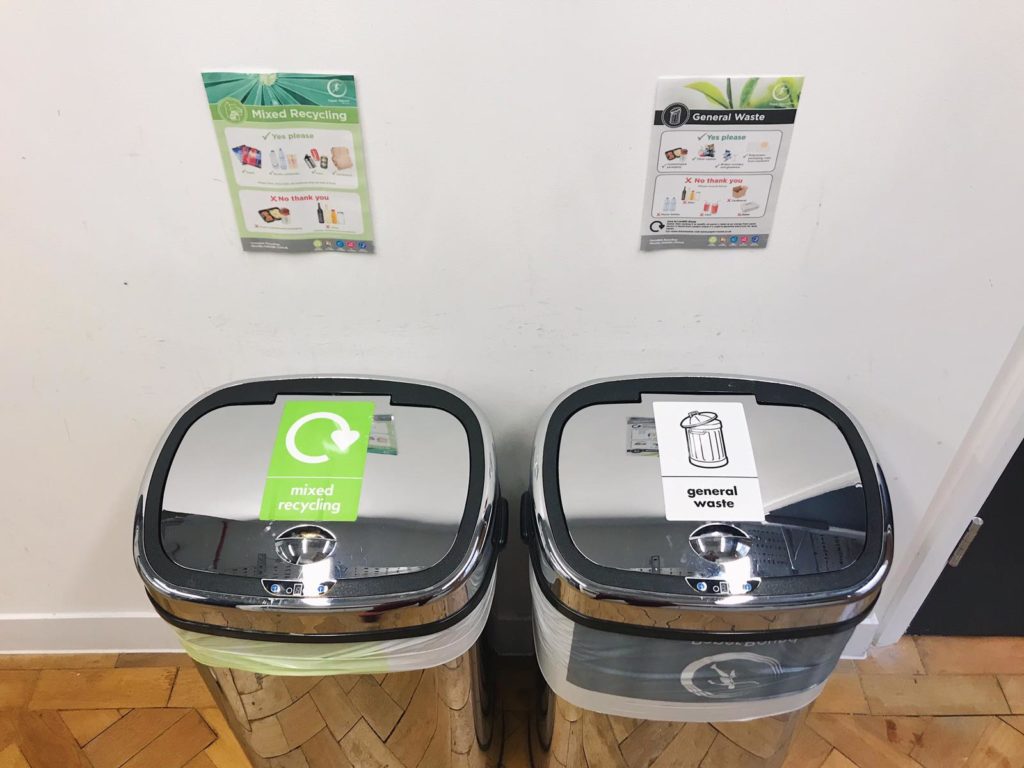Environmental policy: Dos and Don’ts of recycling office waste
26 February 2020, Dr Jasmine Hyman, Category: All insights, News, Tags: environmental policy, paper round mrf, recycling

As a part of our Environmental policy, E Co. Principal consultant Dr Jasmine Hyman and Analyst Sadie DeCoste wrote an article on office recycling, after a visit to Paper Round Materials Recycling Facility (MRF) in London. Learn more about what we learned at the MRF here. Below, they provide a short guide on the Dos and Don’ts of office recycling:
Do:
- Wash out plastics and other food containers, and make sure they are dry, before putting them into the mixed recycling bin.
- Take plastic carrier bags back to a supermarket that accepts them (Sainsburys, Ocado, Waitrose): plastic carrier bags can be recycled but only in single stream settings.
- Empty out coffee cups and put them in, nice and dry, into the recycling bin. A small amount of coffee residue is okay.
- Avoid shredding or ripping paper unless it is confidential: shredding paper reduces the quality of the paper stock (shortens the fibres) and so whole, clean, paper produces the best quality recyclate.
- Put the cap on milk containers and other liquid containers before popping it into the recycling bin: this helps the caps get identified in the sorting process.
- Rinse milk jugs and let them dry before recycling them. Plain plastic jugs can be recycled, but tetrapaks cannot.
- Separate compost (food) from compostable veggie dishware — the dishware has to go to a specialised recycling facility.
- Buy refurbished electronic equipment, especially monitors and cables.
Don’t
- Put greasy, wet items in the recycling bin.
- Don’t put dirty veggie ware in the bin – it is not “composted” with food waste and therefore has to be separated from food.
- Put batteries or electronic waste in the recycling bin or in the regular bin — these items need to be disposed of separately. Batteries are particularly hazardous in the waste stream.
- Put glass in mixed waste recycling bins – glass must be recycled in separate bins that are just for glass.
- Put shredded paper in mixed waste recycling bins – shredded paper must be recycled in separate paper-only streams.
Have you read our environmental policy? If you found this article useful, please share it with your network – and tell us about the steps your office is taking to reduce its environmental impact. Send over an email to amy@ecoltdgroup.com or leave a comment below on this article. We’d love to hear from you.
One Reply
Join the conversation by posting a comment below. You can either use your social account, by clicking on the corresponding icons or simply fill in the form below. All comments are moderated.
Oh yes! I totally agree with you when you specified that relying on reused electrical components can help us to become more eco-conscious eventually. There are lots of old desktops in my office at the moment and I think it’s time we remove them to make some space for newer equipment. I’ll keep this tip in mind so we can get rid of them responsibly. https://clevelandcomputerrecyclingllc.com/computer-recycling